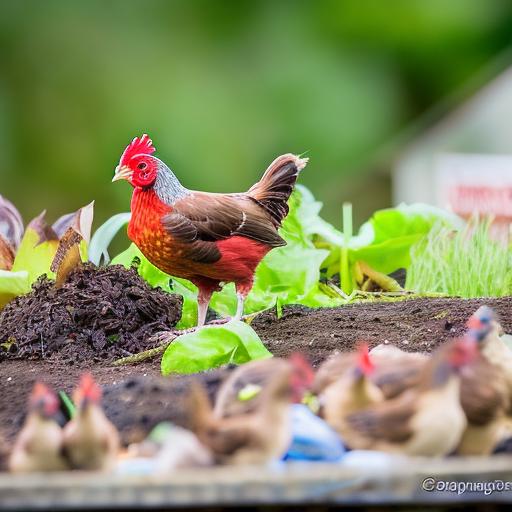Keeping chickens in urban areas has become increasingly popular in recent years. More and more people are realizing the benefits of having their own flock of chickens, even in the midst of a bustling city. Not only do chickens provide fresh eggs, but they also offer natural pest control and fertilizer for gardens. In this article, we will explore the benefits of keeping chickens, the recent decision by the Beaverton City Council to allow residents to keep chickens, the requirements for keeping chickens in Beaverton, and tips for building a chicken coop, choosing the right location, feeding and caring for your chickens, addressing health and safety concerns, and controlling noise and odor.
Key Takeaways
- Keeping chickens has many benefits, including fresh eggs, pest control, and fertilizer production.
- Beaverton City Council has allowed residents to keep chickens with certain requirements.
- Requirements for keeping chickens in Beaverton include a limit on the number of chickens and coop size.
- When building a chicken coop, consider the size and design, as well as the location for optimal safety and comfort.
- Proper feeding and care, as well as addressing health and safety concerns, can ensure happy and healthy chickens and minimize noise and odor issues.
The Benefits of Keeping Chickens
One of the main benefits of keeping chickens in an urban area is the access to fresh eggs. There is nothing quite like gathering eggs from your own backyard and enjoying them for breakfast. Not only are fresh eggs delicious, but they are also more nutritious than store-bought eggs. Chickens that are allowed to roam freely and eat a varied diet produce eggs that are higher in omega-3 fatty acids and vitamins A and E.
Another benefit of keeping chickens is their ability to provide natural pest control. Chickens love to eat insects, slugs, and other pests that can wreak havoc on your garden. By allowing your chickens to free-range in your yard, you can reduce the need for chemical pesticides and keep your garden healthy and thriving.
Chickens also produce high-quality fertilizer for gardens. Their droppings are rich in nitrogen, phosphorus, and potassium, which are essential nutrients for plants. By composting chicken manure and using it as fertilizer, you can improve the health of your soil and promote strong plant growth.
Beaverton City Council’s Decision
In a recent decision, the Beaverton City Council voted to allow residents to keep chickens within city limits. This decision was made in response to the growing interest in urban chicken keeping and the desire for residents to have access to fresh eggs. However, there are some restrictions and regulations in place to ensure that chicken keeping is done responsibly and does not cause any issues for neighbors or the community.
Under the new regulations, residents are required to obtain a permit before keeping chickens. The permit application process includes providing information about the number of chickens you plan to keep, the size and design of your chicken coop, and the location of your coop on your property. There is also a limit on the number of chickens allowed per household, typically around six to eight.
Requirements for Keeping Chickens in Beaverton
In addition to obtaining a permit, there are several other requirements for keeping chickens in Beaverton. First and foremost, you must provide a suitable and secure chicken coop for your flock. The coop must be predator-proof and provide adequate space for the number of chickens you plan to keep. It should also have proper ventilation, nesting boxes for egg-laying, and roosting bars for the chickens to perch on.
You must also provide access to fresh water and nutritious food for your chickens. Chickens require a balanced diet that includes grains, vegetables, and protein. You can purchase commercial chicken feed or supplement their diet with kitchen scraps and garden produce. It is important to monitor their health and behavior regularly to ensure they are getting the proper nutrition and are not showing any signs of illness or distress.
Building a Chicken Coop: Size and Design
Building a proper chicken coop is essential for the health and well-being of your flock. The size of the coop will depend on the number of chickens you plan to keep. As a general rule of thumb, each chicken should have at least 4 square feet of indoor space and 10 square feet of outdoor space. This will allow them enough room to move around comfortably and engage in natural behaviors like scratching and dust bathing.
The design of the coop should also take into consideration the climate and weather conditions in your area. It should provide protection from rain, wind, and extreme temperatures. The coop should have windows or vents for ventilation, but they should be covered with wire mesh to prevent predators from entering. The nesting boxes should be located in a quiet and dark area of the coop to encourage egg-laying.
Choosing the Right Location for Your Chicken Coop

Choosing the right location for your chicken coop is crucial for the health and happiness of your chickens, as well as for maintaining good relationships with your neighbors. The coop should be placed in an area that receives plenty of sunlight, as chickens need natural light to lay eggs and maintain their overall health. However, it is also important to provide some shade in the coop or run to protect the chickens from excessive heat during the summer months.
Consider the proximity to your neighbors when choosing a location for your coop. Chickens can be noisy, especially when they are laying eggs or feeling threatened. Placing the coop away from neighboring houses or using soundproofing materials can help minimize noise disturbances. It is also important to keep the coop clean and odor-free to prevent any unpleasant smells from bothering your neighbors.
Feeding and Caring for Your Chickens
Proper feeding and care are essential for keeping your chickens healthy and happy. Chickens require a balanced diet that includes grains, vegetables, protein, and calcium. Commercial chicken feed is formulated to meet their nutritional needs, but you can also supplement their diet with kitchen scraps and garden produce. It is important to provide fresh water at all times and clean their waterers regularly to prevent bacterial growth.
In addition to feeding, chickens also require regular care and attention. This includes cleaning their coop on a regular basis to prevent the buildup of waste and parasites. You should also monitor their health and behavior daily to ensure they are not showing any signs of illness or distress. Regularly check for mites or lice and treat them promptly if necessary. Providing a dust bath area in the coop or run can help chickens keep themselves clean and free of parasites.
Health and Safety Concerns
When keeping chickens, there are several health and safety concerns that you should be aware of. One common concern is the spread of diseases, such as avian influenza or salmonella. To prevent the spread of diseases, it is important to practice good biosecurity measures, such as washing your hands after handling chickens, disinfecting equipment, and preventing contact with wild birds.
Predators can also pose a threat to your chickens. Common predators include raccoons, foxes, and hawks. To protect your flock, make sure your coop is secure and predator-proof. This includes using sturdy materials, burying wire mesh around the perimeter to prevent digging, and installing locks on doors and windows.
Noise and Odor Control
Noise and odor can be a concern when keeping chickens in an urban area. To minimize noise, choose chicken breeds that are known for being quieter, such as Silkies or Cochins. You can also provide distractions for your chickens, such as toys or treats, to keep them occupied and reduce excessive noise.
To control odor, it is important to keep the coop clean and well-maintained. Regularly remove droppings from the coop and run, and add fresh bedding to absorb moisture and odors. Composting chicken manure can also help reduce odor and provide a valuable source of fertilizer for your garden.
Enjoying Fresh Eggs in the City
Keeping chickens in an urban area can be a rewarding experience that provides fresh eggs, natural pest control, and fertilizer for gardens. With the recent decision by the Beaverton City Council to allow residents to keep chickens, more people have the opportunity to enjoy these benefits. By following the requirements for keeping chickens, building a proper coop, choosing the right location, and providing proper care and nutrition, you can successfully keep chickens in an urban setting and enjoy the many rewards they bring.
If you’re interested in keeping chickens in the city, you might also want to learn about the fascinating world of ducks and geese. Did you know that ducks have a specific mating season? Find out more about when duck mating season occurs and what it entails in this informative article: When is Duck Mating Season? Additionally, if you’re curious about geese, you may be wondering how many eggs they lay. Discover the answer and gain insights into breeding geese in this helpful read: How Many Eggs Do Geese Lay? And if you’re already keeping ducks or planning to do so, it’s essential to know what to feed them. Learn about the best diet for ducks and ensure their health and well-being with this comprehensive guide: What Should You Feed Ducks?
FAQs
What is the article about?
The article is about the Beaverton City Council approving the keeping of chickens in the city.
What does the approval mean?
The approval means that residents of Beaverton are now allowed to keep chickens in their backyards.
Are there any restrictions on keeping chickens?
Yes, there are restrictions on keeping chickens. Residents are allowed to keep up to six chickens, and roosters are not allowed. The chickens must also be kept in a secure coop or enclosure.
Why did the city council approve keeping chickens?
The city council approved keeping chickens as a way to promote sustainable living and provide residents with the opportunity to raise their own food.
What are the benefits of keeping chickens?
Keeping chickens can provide a source of fresh eggs, fertilizer for gardens, and can be a fun and educational hobby for families.
What are the potential drawbacks of keeping chickens?
Potential drawbacks of keeping chickens include noise, odor, and the possibility of attracting predators such as raccoons or coyotes. It is important for residents to properly care for and secure their chickens to prevent these issues.
Meet Walter, the feathered-friend fanatic of Florida! Nestled in the sunshine state, Walter struts through life with his feathered companions, clucking his way to happiness. With a coop that’s fancier than a five-star hotel, he’s the Don Juan of the chicken world. When he’s not teaching his hens to do the cha-cha, you’ll find him in a heated debate with his prized rooster, Sir Clucks-a-Lot. Walter’s poultry passion is no yolk; he’s the sunny-side-up guy you never knew you needed in your flock of friends!







